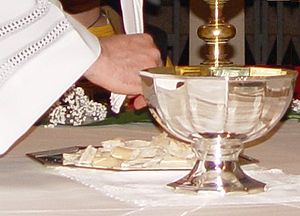
Among the elements that sets Catholicism apart from almost all other Christian denominations is the notion of the sacred embodied in the physical. There are a host of sacred objects in Catholicism, while Protestantism considers almost nothing on Earth sacred. Only God is sacred, say Protestants, and that was indeed one of the myriad motivations for the separation of the Protestant denominations from the Catholic church.
Having grown up in a Protestant group (though it would have never called itself “Protestant,” it was: if it’s not Eastern/Greek/Coptic/etc. Orthodox or Catholic, it’s Protestant), the notion of a sacred object was completely foreign to me. It smacked of superstition, of primitive belief that bordered on idolatry.
Websters.com defines sacred as follows:
- dedicated or set apart for the service or worship of a deity
- a : worthy of religious veneration : holy
b : entitled to reverence and respect- of or relating to religion : not secular or profane
I grew up, I suppose, with only the second definition; the first definition is more Catholic, though.
In Catholicism, one can’t help but be overwhelmed by the number of sacred objects. At the top of the list is the consecrated host, but there are numerous others: the Bible is sacred, especially the Gospels. One will notice this immediately in the how the priest handles the volume of Gospels the priest uses in the Mass reading. Yet it’s not limited to the Bible and host: the church itself, the crucifix, the vessels used in Mass, the altar itself, rosaries, statues, and icons are all in their own right sacred.
This is where the Protestant accusation of idolatry arises, especially with the use of icons and statuary. It seems to be a direct violation of the commandments. Yet Catholics aren’t worshiping these objects (except for the consecrated host — but that’s an entirely different theological knot) and in fact condemns such as idolatry.
What I like about sacred objects is they force one out of normal routines and require a reverent thoughtfulness. In a culture in which only radical individualism seems to be sacred, such thoughtful moments are welcome.